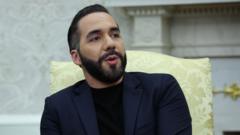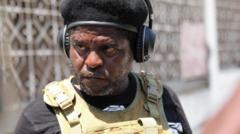The situation surrounding Kilmar Ábrego García, a Salvadoran national mistakenly deported to El Salvador, has summoned significant apprehension regarding human rights and legal oversight. Despite a U.S. Supreme Court ruling that supports his return, President Nayib Bukele has decried this misstep as an administrative error, emphasizing the strained relationship between immigration enforcement policies and justice.
### El Salvador's Stance on Mistaken Deportation Raises Concerns Over Human Rights

### El Salvador's Stance on Mistaken Deportation Raises Concerns Over Human Rights
In a controversial ruling, El Salvador's President Nayib Bukele states that Kilmar Ábrego García, an American deportee returned to El Salvador by mistake, will not be sent back to the U.S.
In a recent meeting at the White House, President Nayib Bukele confirmed that he would not facilitate the return of Kilmar Ábrego García, a native who has been detained in a high-security prison known as the Center for the Confinement of Terrorism (Cecot). His deportation raises troubling questions regarding the handling of immigrants and the implications of collaborative deportation initiatives between the U.S. and El Salvador. García, who lived in Maryland and was granted legal protection from deportation in 2019, finds himself caught in a politically charged atmosphere, with past interactions between President Bukele and former U.S. President Donald Trump further complicating the matter.
“Mr. Ábrego García should never have been deported in the first place; he is not a gang member as claimed by the authorities,” his lawyer argues. This sentiment echoes the concerns of many family members of deportees, who allege that their loved ones are often wrongfully classified as gang affiliations based on superficial characteristics, such as tattoos.
The U.S. administration has sent numerous individuals back to El Salvador under the premise of combating gang violence, with a particular focus on notorious groups MS-13 and Tren de Aragua. Critics, however, have expressed alarm over the conditions at Cecot and potential human rights violations occurring within its walls. Despite urgencies expressed through legal channels urging the return of the wrongfully deported, the cooperation between U.S. and Salvadoran administrations sets a perilous precedent where individuals’ rights hinge on the fluctuating tide of political affiliations and promises.
While Secretary of State Marco Rubio heralds the partnership as a model of security and regional stability, many human rights activists highlight the stark dangers posed to deportees and the ethical considerations overshadowed by policy-making. The fate of Kilmar Ábrego García stands as a litmus test for the human rights conditions in El Salvador, catching international attention as a growing discourse on the treatment of deportees emerges from this unsettling backdrop.
As the situation evolves, the call for accountability and transparency remains crucial, with advocacy groups urging legal reforms that prioritize the rights and humanity of individuals caught in the crosshairs of complex immigration laws and geopolitical maneuvers.
“Mr. Ábrego García should never have been deported in the first place; he is not a gang member as claimed by the authorities,” his lawyer argues. This sentiment echoes the concerns of many family members of deportees, who allege that their loved ones are often wrongfully classified as gang affiliations based on superficial characteristics, such as tattoos.
The U.S. administration has sent numerous individuals back to El Salvador under the premise of combating gang violence, with a particular focus on notorious groups MS-13 and Tren de Aragua. Critics, however, have expressed alarm over the conditions at Cecot and potential human rights violations occurring within its walls. Despite urgencies expressed through legal channels urging the return of the wrongfully deported, the cooperation between U.S. and Salvadoran administrations sets a perilous precedent where individuals’ rights hinge on the fluctuating tide of political affiliations and promises.
While Secretary of State Marco Rubio heralds the partnership as a model of security and regional stability, many human rights activists highlight the stark dangers posed to deportees and the ethical considerations overshadowed by policy-making. The fate of Kilmar Ábrego García stands as a litmus test for the human rights conditions in El Salvador, catching international attention as a growing discourse on the treatment of deportees emerges from this unsettling backdrop.
As the situation evolves, the call for accountability and transparency remains crucial, with advocacy groups urging legal reforms that prioritize the rights and humanity of individuals caught in the crosshairs of complex immigration laws and geopolitical maneuvers.



















